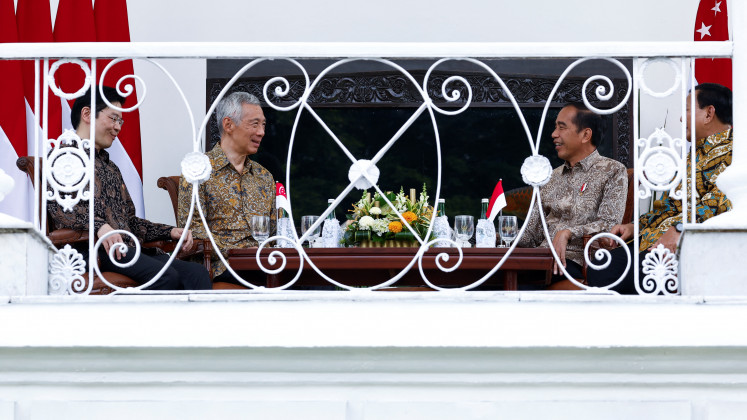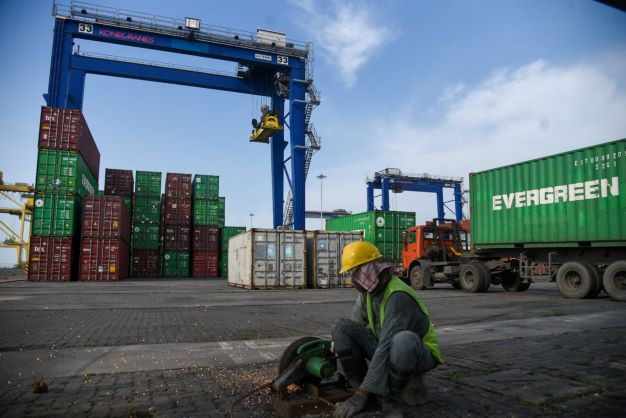[COMMENTARY] Tested pneumonia vaccine can save Indonesia’s healthcare system
Indonesia is among 15 countries with the highest number of under-5 pneumonia and diarrhea deaths, according to the Pneumonia and Diarrhea Progress Report 2020, which was recently released by the International Vaccine Access Center (IVAC) at the Johns Hopkins Bloomberg School of Public Health.
Change Size
![[COMMENTARY] Tested pneumonia vaccine can save Indonesia’s healthcare system](https://img.jakpost.net/c/2020/07/30/2020_07_30_101326_1596094865._large.jpg)
T
he coronavirus pandemic has revealed how fragile the global health system is. Worse, the pandemic may threaten years of global progress against pneumonia and diarrhea – two of the most common causes of childhood deaths.
Vaccination, therefore, is something Indonesia can pursue to prevent child deaths and prepare for any outbreaks in the future. Countries worldwide are now competing to be the first to secure a coronavirus vaccine, and this means that health interventions, such as immunization, must be a priority.
Indonesia is among 15 countries with the highest number of under-5 pneumonia and diarrhea deaths, according to the Pneumonia and Diarrhea Progress Report 2020, which was recently released by the International Vaccine Access Center (IVAC) at the Johns Hopkins Bloomberg School of Public Health. The report tracks countries’ progress in preventing pneumonia and diarrhea deaths based on their performance across the Global Action Plan for the Prevention and Control of Pneumonia and Diarrhea (GAPPD) indicators.
Published by the World Health Organization and UNICEF in 2009 and 2013, the GAPPD calls for action toward achieving a global 75 percent reduction in the incidences of severe pneumonia and diarrhea in children under 5 by 2025. The GAPPD sets core interventions to successfully prevent, protect and treat children who are at risk of serious illness or death due to these two diseases.
According to the IVAC progress report, 1.24 million children under 5 died of pneumonia and diarrhea in 2017. Indonesia recorded 27,422 deaths, or 5.6 deaths per 1,000 live births, outranking all other Southeast Asian countries and China.
Indonesia has also been highlighted in the report for progress it made in procuring the pneumococcal conjugate vaccine (PCV13). Through a long and complicated process that required major ministerial engagement outside the health sector and higher levels of government, Indonesia managed to secure an agreement that grants it access to PCV13 through Gavi’s Advance Market Commitment (AMC) mechanism. Through this mechanism, Indonesia can get the vaccine for a quarter of the previous cost.
In its PCV roll-out plan, Indonesia aims to reach all 5 million babies born in the country each year by 2024.
“This will have significant outcomes on child mortality in the country and overall child well-being,” said Sowmya Kadandale, UNICEF Indonesia’s health unit chief, who wrote a chapter entitled “Indonesia to introduce PCV into routine immunization program” in the report.
Kadandale highlights pandemic-induced disruptions in the delivery of essential health services in Indonesia, including immunization. Diphtheria, pertussis and tetanus (DPT3) and measles and rubella (MR1) vaccination coverage rates declined by more than 35 percent from March to May 2020 compared to the same period of last year.
Indonesia’s decision to adopt Gavi’s AMC mechanism this year was a crucial and monumental achievement. Under the agreement with UNICEF, the road is open for Indonesia to purchase high-quality commodities at lower prices, including vaccines, medicines and equipment, through the UNICEF Supply Division in Copenhagen.
As of today, however, Indonesia has only introduced the vaccine in two pilot provinces – Bangka Belitung and West Nusa Tenggara. The Health Ministry says the ongoing pandemic is responsible for the postponement of its plan to expand the use of the vaccine to other areas.
While admitting the financial impact of the coronavirus has shifted budget priorities to support current pandemic needs, Indonesian Technical Advisory Group on Immunization (ITAGI) health systems specialist Soewarta Kosen also blamed governmental inertia for the slow progress in making PCV an important tool.
“This slowness has also happened because of the absence of champions in the health sector that can consistently promote and campaign for the importance of a pneumococcal vaccine to protect children from pneumonia,” Soewarta told The Jakarta Post via text message on Nov. 12.
To reduce childhood pneumonia illness and deaths, improved access to vaccines against four important pneumonia-causing diseases – pneumococcus, Haemophilus influenzae type B (Hib), pertussis and measles – is a must. Indonesia’s plan to introduce PCV into its national immunization program, which has covered Hib, pertussis and measles vaccines, is hence pivotal in its bid to lower childhood deaths.
Molly Sauer, an IVAC research associate at the Johns Hopkins Bloomberg School of Public Health’s Department of International Health, has said that, in settings where PCV is not used, about one-third of pneumonia deaths in children aged under 5 are due to pneumococcus. Fortunately, three safe and effective WHO-prequalified vaccines are available today, and at least one of these vaccines is used in the national immunization programs of 145 countries.
Sauer said accelerating access to PCV and ensuring it reaches the children at greatest risk of serious disease was an important step in reducing childhood pneumonia illnesses and deaths in Indonesia.
“Indonesia’s plan to roll out PCV nationwide will also be critical to prevent the health and economic impacts of pneumonia,” the researcher said, adding that PCV introduction could ensure equity and reach the most vulnerable children, including those living in poverty or with limited access to care.
COVID-19 and the global race to find a vaccine have taught us a lesson on the importance of preventive intervention. With most budgets and energy dedicated to the COVID-19 response, it’s unfair for children to continue to miss out on the benefits of PCV due to prolonged delays in the use of pneumococcal vaccines.
Through vaccination, the government can help its people avoid the need for emergency cases and keep hospital beds available in a time of pandemic. A cost-effective intervention may reduce the burden on families and Indonesia’s health system caused by high-cost medical treatments of this common yet serious disease.
----------
Staff writer at The Jakarta Post









